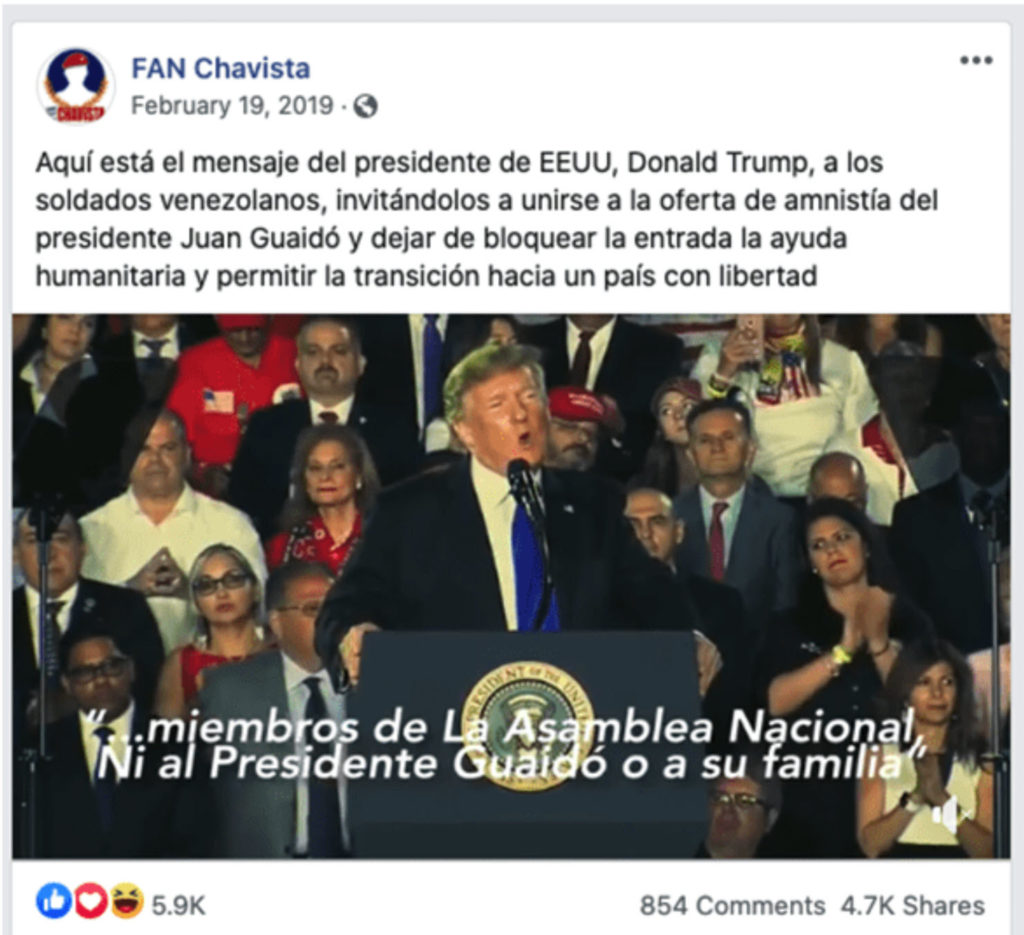A Washington D.C.-based PR firm was caught by Facebook in August running dozens of fake accounts in order to influence politics in Latin American countries. The firm, CLS Strategies, had 46 Facebook accounts, 41 Pages and 24 Instagram accounts taken down by Facebook for posting and running $3.6 million worth of ads under false identities in support of right-wing political parties in Venezuela, Bolivia, and Mexico. It was the first time a U.S. firm has had accounts removed from Facebook for violating the social media company’s policies against coordinated inauthentic behavior.
The largest share of CLS Strategies’ sock puppet content was deployed in Venezuela and promoted the political opposition to the country’s president, Nicola Maduro, including figures like former presidential candidate Henrique Caprile and National Assembly President Juan Guaidó, according to a report from Stanford Internet Observatory. The CLS Strategies-managed Instagram account @FrenteLibreVzla posted a video in January 2019 claiming that Guaidó would lead the country to freedom, for example, while a Facebook page it managed, Fan Chavista, promoted statements made by U.S. President Donald Trump in support of Guaidó.
In Bolivia, CLS Strategies intervened in the country’s politics to bolster the right-wing regime headed by Movimiento Demócrata Social party member Jeanine Áñez, the country’s interim president. CLS Strategies set up and managed eleven pro-Áñez Facebook pages, the most popular being a page called “Todos con Áñez” (Everyone with Áñez), which attracted 2,786 likes in the seven months that it was active. Other pages like “Prohibido olvidar” (“Forbidden to Forget”) focused mainly on discrediting the country’s former socialist president Evo Morales, who was ousted following a contested 2019 election in a military-backed coup.

CLS’ ads and social media pages spread disinformation about leftist politicians and parties in Venezuela, Bolivia and Mexico, while amplifying information and slogans favorable to U.S.-backed figures, such as by posing as a Bolivian fact-checking outlet, “Bolificado,” that deemed claims about Áñez to be “fake news” even when they had been recognized as true by reputable news organizations. In a statement on its website, CLS defended its work in Latin America by explaining that it was funded and directed by clients inside each country.
In taking down the CLS Strategies’ networks of fake pages and accounts, Facebook said it was making progress in rooting out politically focused coordinated inauthentic behavior but that it was an ongoing effort. “We’re committed to continually improving to stay ahead,” Facebook wrote in the report announcing the takedowns. “That means building better technology, hiring more people and working closely with law enforcement, security experts and other companies.”
The revelations about CLS Strategies’ troll farm activities, however, do not instill confidence in Facebook’s efforts. Sludge found that several of the CLS employees who appear to have been involved in the efforts have deep and long-standing ties to organizations that Facebook has partnered with to combat propaganda and misinformation around elections throughout the world.
In the days after the news of the account suspensions broke, CLS Strategies scrubbed its website to remove information about five of its employees, all of whom had had their Facebook pages removed, according to the Stanford report. Sludge found that several of the scrubbed employees have ties to Facebook’s foreign election integrity partners.
Deep Ties to Facebook Election Partners
In September 2018, Facebook executives announced the company was partnering with the National Democratic Institute (NDI) and the International Republican Institute (IRI) “to slow the global spread of misinformation that could influence elections.”
IRI Senior Advisor Amy Studdart told Sludge that her groups’ work, which is financially supported by Facebook, is done under the banner of Design 4 Democracy, a coalition of nonprofits working on strategically-aligned initiatives with a shared mission to make tech platforms more democracy-friendly. Studdart said IRI’s work with Facebook is solely international and has no U.S. focus.
A lobbying contribution report filed by Facebook shows that the company paid IRI $490,000 in 2019. Facebook is not required to disclose funds paid to NDI under the Lobbying Disclosure Act because, unlike IRI, NDI is not controlled by a current member of Congress.
NDI and IRI were both created in 1983 by the Reagan administration as nonprofits with missions to promote democracy abroad. IRI is informally affiliated with the Republican Party and is currently chaired by Sen. Dan Stevens (R-Alaska) and contains multiple Republican senators and representatives on its board, while NDI is informally affiliated with the Democratic Party and contains former elected officials and the husband of Sen. Dianne Feinstein (D-Calif.) on its board. Both groups receive most of their funding from the federal government through entities including the National Endowment for Democracy, the U.S. Agency for International Development (USAID), and the State Department.
IRI and NDI have both backed opposition political parties in Venezuela for years. In 2000, IRI established an office in Caracas and began working to build relationships with political opposition leaders, including a program to help opposition parties develop youth outreach strategies and internal governance structures, according to a paper by Timothy Michael Gill, assistant professor of sociology at the University of North Carolina. In 2006, IRI helped Manuel Rosales in his campaign against Hugo Chávez, bringing in technical experts to help with polling and government relations, according to a diplomatic cable published by Wikileaks. Another diplomatic cable published by Wikileaks describes NDI’s $500,000 effort, beginning in 2005, focused on transforming and strengthening opposition parties in Venezuela.


